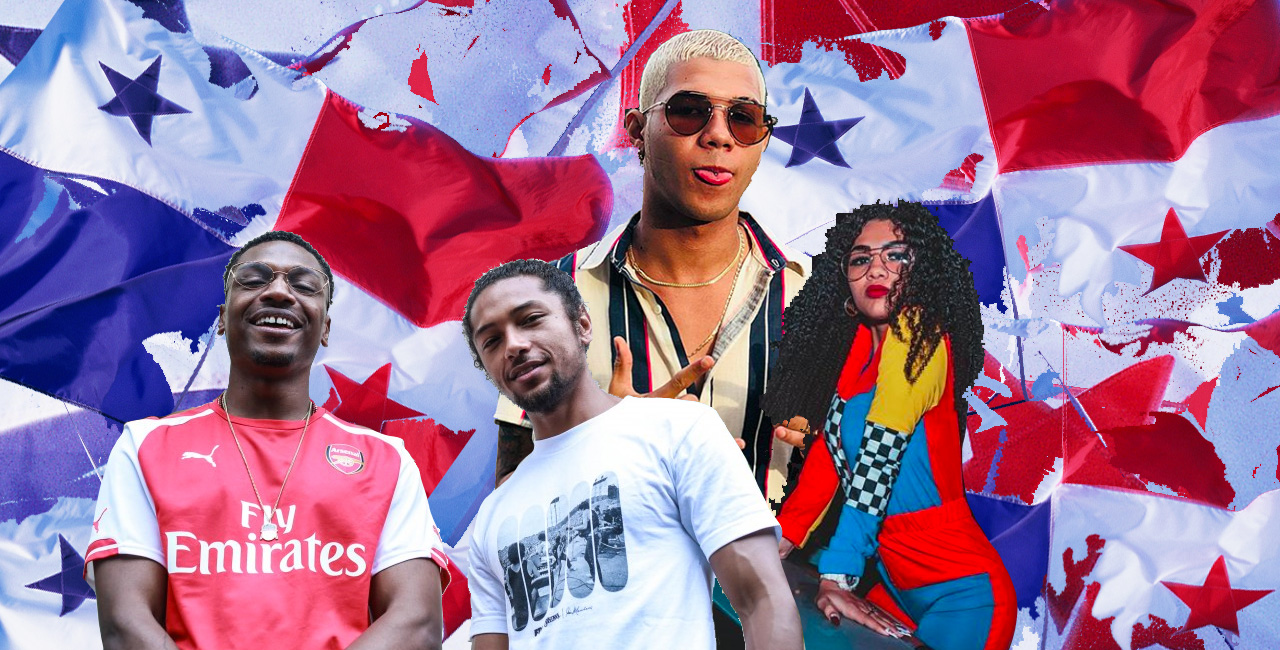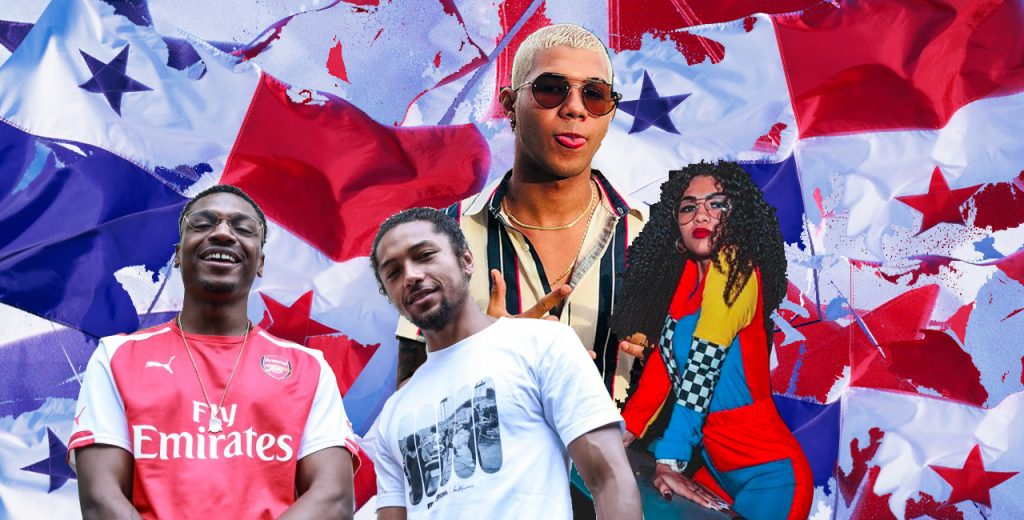Growing up in Brooklyn’s Fort Greene neighborhood, Puerto Rican-Panamanian DJ Bembona was raised on a heavy dose of Bori soundscapes. She was well-versed on la isla del encanto’s salsa orchestras and its reggaetoneros who, at the time, were dominating local radio stations. But she knew less of artists coming out of Panama, the oft-forgotten originators of reggae en español (or plena), a genre that largely influenced the more popular vibras of el caribe. As one of New York’s most exciting DJs, Bembona is on a mission to reclaim Panama’s disregarded contributions to the game and uplift current talent in the Central American country.
“Panama hasn’t gotten that much attention. There are a lot of Black artists killing it, but they don’t fit the mold of what the mainstream market, or the American market, is looking for. They’re not getting the shine they deserve, and it saddens me,” the 27-year-old told Remezcla.
On November 16, Bembona will celebrate Panama’s independence from Spain – a nearly three-week emancipation struggle that ended on November 28, 1821 – by dedicating her monthly summer party Vibras NYC to the rhythms del Istmo, a time for her to spin little-known Panamanian artists, exclusively. There will be meneo to classic bangers by legends like Kafu Banton, Japanese, Mr Fox, Aldo Ranks, El Roockie and Toby King as well as preview new talents they likely haven’t heard yet.
“I want to showcase everything Panamanian artists contributed to music culture and nightlife, to celebrate that. My purest intention is to make sure Panamanians know we are out here doing things, and to connect, build and let our presence be known,” said Bembona.
To pre-game, we asked Bembona to share a list of current and rising Panamanian urbano artists with us. She dropped 9 rappers and singers who are standing out in dancehall, reggaeton, Latin trap, hip-hop and more.
Vibras NYC hits New York’s Baby’s All Right on November 16. For more information and to buy tickets, click here.
BOZA
Reggaeton lento has taken over Latin America, and in Panama, Boza is one of the genre’s most illustrious young talents. Signed to Panama Music, the central record label for urbano artists in the country, he’s known for baring his soul – and his acute sex drive – over slowed-down reggaeton-electronico beats. “This is the young papi chulo coming up and making waves in the scene. His music is a fusion and is a lot like what we are already hearing but in a Panamanian world. He’s one of the younger cats, but he’s selling out shows and really killing it,” said Bembona.
MR. SAIK
While Bembona considers Mr. Saik an OG in the game, he’s still making music that bangs. Known as one of the more controversial artists (last year, he took down a song that speaks contemptuously of Venezuelan women), the Dominican-born, Panamanian-raised rapero is one of the country’s biggest names in Spanish-language dancehall. “His music is really making waves even across the waters. He’s known for collaborating with different artists. What I really like about him is his music is a tribute to Jamaican culture. Like with reggae, you often hear him rapping over the same classic beats, but making new songs of out them and giving them different points of view.”
KENNY MAN
Throughout Kenny Man‘s career, he has been described as a conscious rapper, preferring to rhyme about political corruption over tough beats instead of making danceable records. That changed this year, when the panameño dropped “Ni Gucci Ni Prada,” a mid-tempo hit about a girl unimpressed by the finer things in life. The song went global, catching the attention of Universal Music Latin, who signed the young rapper. According to Kenny, the industry wants reggae and reggaeton, and he’s prepared to give them that – until he gains the attention of masses and can return to the socially critical hip-hop he prefers. “He’s a brown rapper giving a nod to Afro beats. He’s definitely ahead of the game,” Bembona said.
ROBINHO
Like Mr. Saik, Robinho has been making reggae en español jams for about a decade, and he’s definitely still keeping up with those on the come up, dropping boastful anthems like his 2018 hit “Si Yo Tuviera.” But while Robinho, who Bembona describes as a “Panamanian Shaggy,” is mostly known for producing dancehall, he’s hoping to venture out of urbano, recently performing Álvaro Torres and Selena’s “Buenos Amigos” with friend and fellow panameña Ana Sibauste and considering making a salsa album. Till then, Bembona says his “eclectic style and appearance” will continue to make him a fan favorite in Panamanian urbano.
BCA
One of the new artists Robinho is embracing is BCA. When BCA entered the scene in 2016, acclaimed Panamanian DJ and radio personality Carlos Rivera, better known as DJ Cucaracha, crowned him artist of the year, and he’s been delivering hits, including collaborations with Boza, ever since. “His urbano, reggae- dancehall is making waves, and not just in Panama,” Bembona tells me. “He’s having parties and concerts in Miami as well.”
DEMPHRA
When La Factoria released “Perdoname” in 2007, the Panamanian reggaeton and reggae en español group gained international success, winning several awards for the chart-topping single. Since then, La Factoria’s lead female rapper, Demphra, left the group to go solo, becoming one of the prime women’s voices in Panamanian urban music. Born in the Dominican Republic and raised in Panama City, she often melds sounds from both of her cultures, recently debuting the dembow-EDM banger “La Reina.” “It’s super difficult to find Panamanian artists, and it’s even harder to find women. But Demphra has been making mainstream hits, and now she’s standing her ground and building her empire as a solo artist. She’s doing her thing and continuing her legacy,” Bembona said.
ANYURI
Demphra’s massive success in urbano helped pave a way for Anyuri, Panama’s rising female voice in reggae. Signed to Panama Music, Anyuri has released several girl power jams, like “De Perro A Venao,” where she lambasts trash men, and “Soltera,” an anthem for independent women who don’t let romantic heartbreak dictate their lives. “I have to give Anyuri props, being one of the only women in the game. She’s really leveling up to the guys in the scene. She’s not a delicate flower. She’s a mujer who owns her sexuality. She’s very coqueta, very in her estilo, very femme and very demanding and boss. She reminds me of that popular girl from high school,” Bembona said.
SHYNO
Shyno is hands-down one of the most vicious artists Latin trap artists in his country. With millions of YouTube views and a co-sign from reggaeton rey Nicky Jam, the Asian-Panamanian rapper’s hard-hitting lyrics on everything from drugs and sex to race and class discrimination have gained worldwide attention. “Honestly, I’m still not sure how I feel about him. His flow is insane and his lyrics go as hard as Bad Bunny’s do. He’s a talented gangsta rap emcee for sure, but all of his music has like naked women in it. It’s very misogynistic,” Bembona said.
LOS RAKAS
Oakland-based Panamanian-American duo Los Rakas aren’t new to the scene. The Grammy-nominated hip-hop twosome, made up of cousins Raka Rich and Raka Dun, have been melding rap with reggae, reggaeton and dancehall since 2006, and they’re currently cooking up new fuego for their next album. For Bembona, their presence on this list is obligatory. “These are mis hermanos. They’ve been doing this before J Balvin and Bad Bunny. They’ve been revolutionizing urbano sounds for a while, experimenting with sounds like reggae, plena, electronic, and hip-hop. People have been paying attention to them, but I still don’t think they’ve gotten the proper respect they deserve,” she said.




